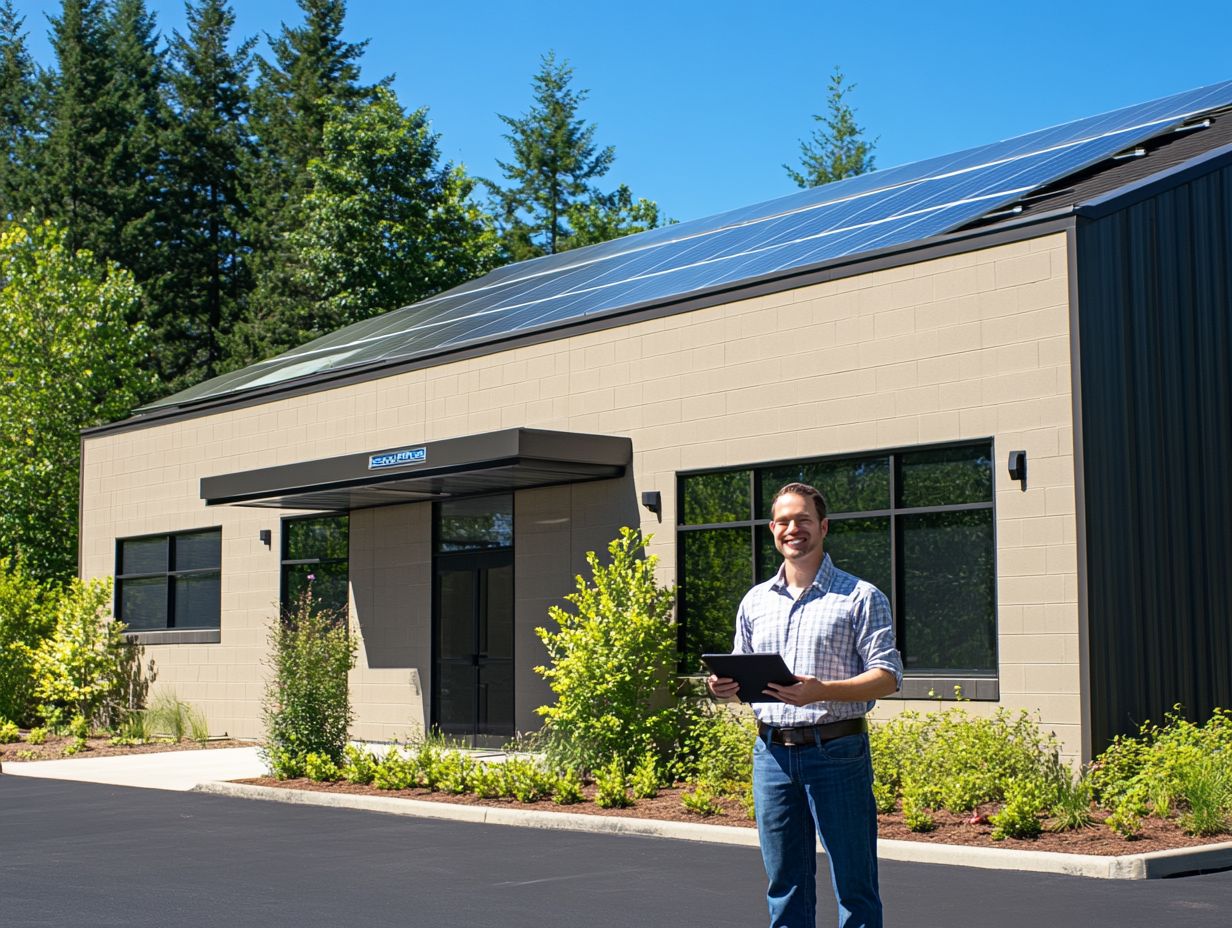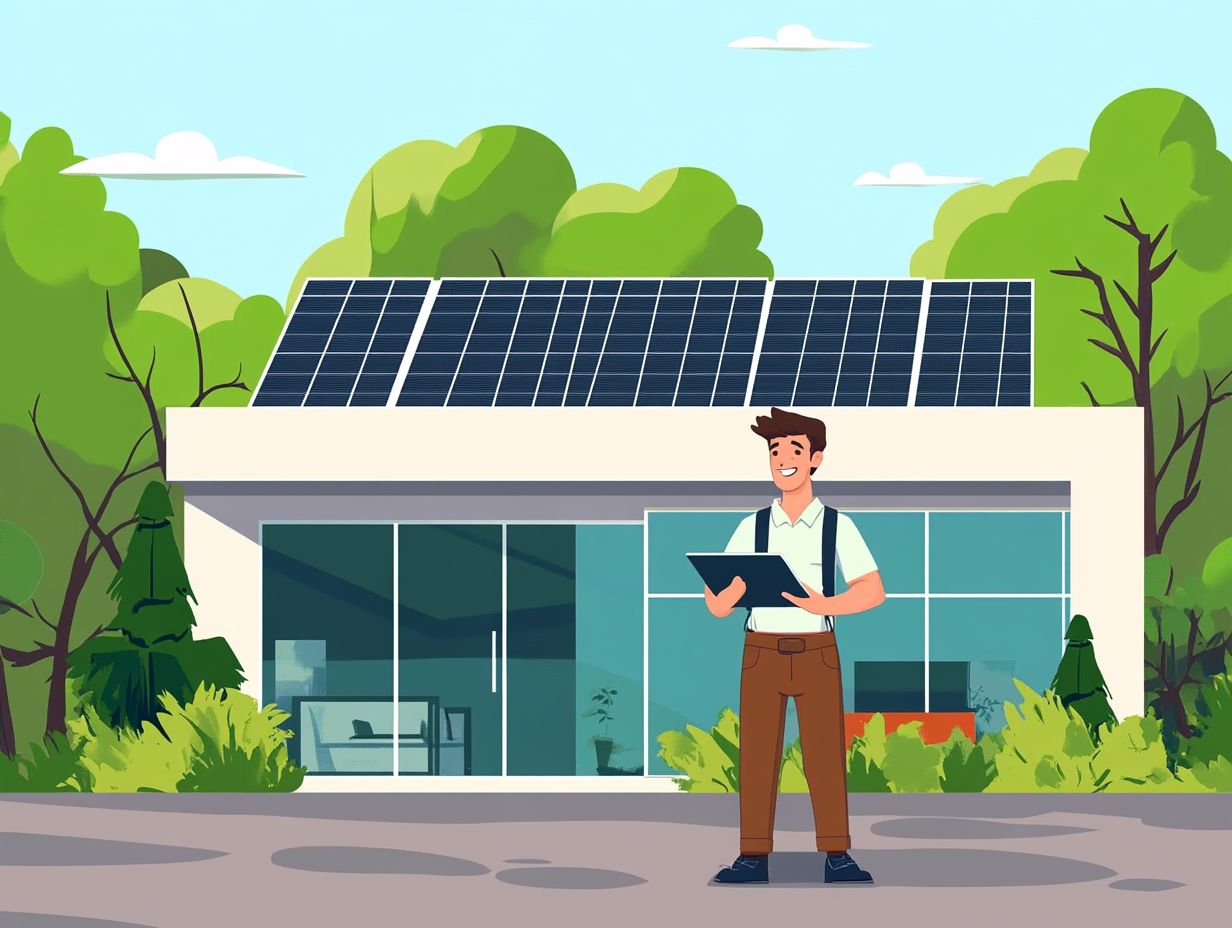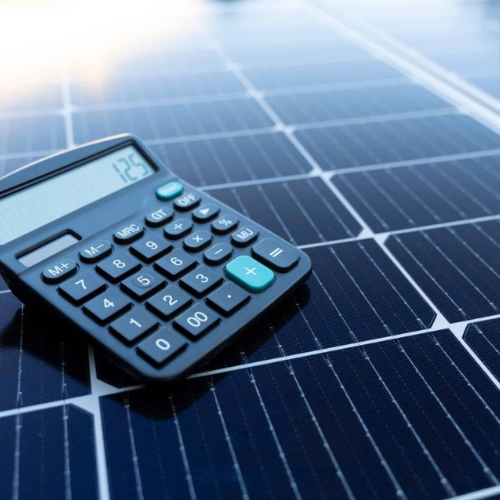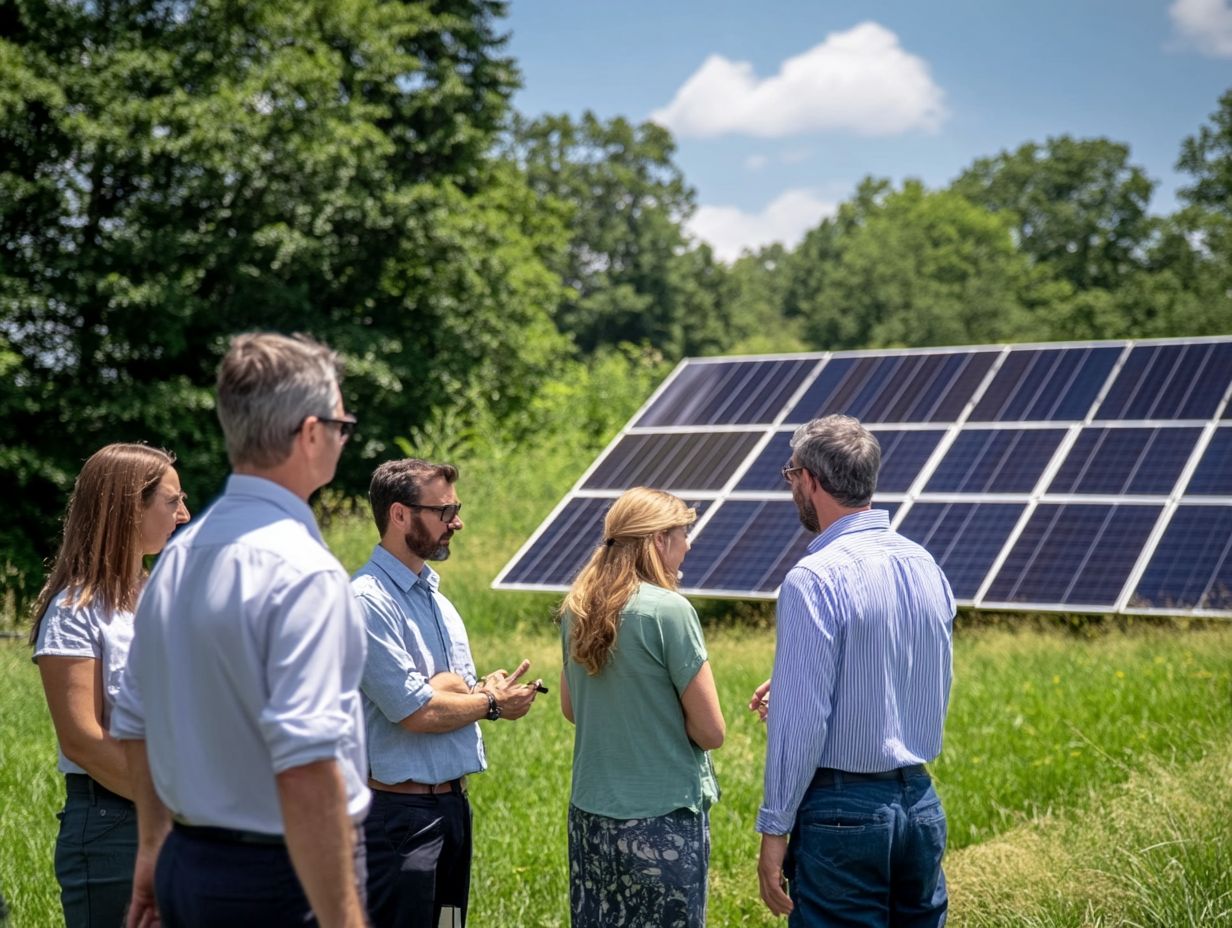Contents
- 1 Maximizing Financial Savings from Solar Panels
- 2 Environmental Benefits of Solar Panels
- 3 Guide to Installation and Maintenance of Solar Panels
- 4 Frequently Asked Questions about Solar Panels
- 4.1 Benefits of solar panels for businesses
- 4.2 How do solar panels help businesses save money?
- 4.3 Can solar panels benefit a business’s bottom line?
- 4.4 Do solar panels require a lot of maintenance for businesses?
- 4.5 How do solar panels contribute to a business’s environmental sustainability efforts?
- 4.6 Do solar panels enhance property value for businesses?
In today’s fast-paced business world, adopting renewable energy sources like solar panels isn’t just a nice idea anymore; it’s quickly becoming a must-have for achieving energy independence and enhancing business growth.
Solar panels offer numerous advantages for businesses, including substantial financial savings and reduced energy costs, to some pretty attractive tax incentives and rebates.
But it’s not just about the money. By embracing solar energy, you can also lower your carbon footprint, improve energy efficiency, and boost your corporate social responsibility game.
This article dives into the financial and environmental benefits of solar panels, including the cost reduction and long-term investment advantages, along with the installation and maintenance processes, so you’ll be all set to tap into the power of the sun.
Understanding Solar Panels

Solar panels, or commonly known as photovoltaic systems, are pretty amazing technologies that turn sunlight into electricity, promoting sustainable development and fiscal savings.
They’re a big deal in the world of renewable energy. By harnessing solar energy, you can generate clean electricity, promote sustainability, and reduce your reliance on fossil fuels, thereby contributing to climate change mitigation.
Plus, using solar panels can help you lower your carbon footprint and do your part for a greener planet, all while reaping some significant financial advantages such as utility savings and government rebates.
There are different types of solar panels, each with its own unique components and features that suit various needs. For instance, monocrystalline panels are made from a single crystal structure and are known for their high efficiency and compact design—perfect for residential setups in urban areas where space is tight.
Then we have polycrystalline panels. They’re usually more budget-friendly and offer a slightly lower efficiency, making them a popular pick for larger installations.
If you’re looking for something lightweight and flexible, thin-film solar panels are where it’s at, offering both energy diversification and localized energy production. They can be used creatively, like on the roofs of vehicles or portable charging devices.
Whether you’re leaning toward grid-tied systems that connect to the electricity grid for easy access to energy or off-grid systems that give you complete independence, choosing the right type of solar panel is crucial for getting the most energy output and cost savings.
Benefits for Businesses
Incorporating solar panels into your business operations comes with a whole host of benefits that can really make a difference, including enhanced business reputation and energy optimization. You’ll save on costs, boost energy efficiency, and show off your commitment to sustainability and corporate responsibility.
By investing in solar energy, you can chop down those utility bills, improve how the public sees your business, and give yourself an edge in a crowded market. Plus, the long-term savings and return on investment from solar panels can make a serious impact on your bottom line.
But it’s not just about saving money. When you implement energy management solutions through solar energy, you can also boost employee morale and workplace satisfaction through eco-friendly practices.
When your team sees the company embracing eco-friendly practices, it sparks a sense of pride and connection to values they care about, which can lead to higher productivity and job satisfaction.
On top of that, businesses that enhance their brand reputation with sustainable practices might qualify for various financial incentives. This means even more opportunities to invest in innovative technologies.
Making the shift to eco-conscious practices can also grab the attention of environmentally aware consumers, which could boost customer loyalty, expand your market reach, and provide a competitive advantage.
It really creates a wonderful cycle of success driven by responsible energy consumption.
Barbose, G., Darghouth, N., Millstein, D., Spears, M., Wiser, R., Buckley, M., Widiss, R., & Grue, N. (2016). Tracking the Sun: Installed Price Trends for Distributed Photovoltaic Systems in the United States. Lawrence Berkeley National Laboratory. Link
Maximizing Financial Savings from Solar Panels
Investing in solar panels can open the door to some serious financial savings for your business, particularly through solar incentives and renewable energy credits. You’ll be able to cut down on energy costs and take advantage of available tax incentives, which can really boost your return on investment.
By reducing your reliance on traditional energy sources, you’ll enjoy lower energy bills, leading to long-term savings and better cash flow. With all these financial perks, solar energy is definitely a smart choice for any business looking to fuel its economic growth and infrastructure investment.
Reducing Energy Costs
By installing solar panels, you can significantly cut down on energy costs and lower those pesky utility bills, which will have a meaningful impact on your business’s operational efficiency.
Embracing solar energy helps you create a more sustainable energy strategy while enjoying the perks of energy independence. As you make the switch to renewable energy, you’ll gain better management and control over your energy consumption.
Exploring options like net metering can also bring you extra financial benefits, allowing you to earn credits for any excess energy you produce and send back to the grid, thus boosting energy resilience and optimizing energy performance.
Conducting energy audits is another smart move; these assessments help you identify areas where you can improve your energy use, so you can make smarter energy choices and enhance operational efficiency.
And don’t forget about power purchase agreements! They can give you access to solar energy without the hefty upfront costs, making the transition smoother and more feasible, while contributing to fiscal savings and energy reliability.
When you put all these strategies together, you not only boost your energy savings, but you also strengthen your overall sustainability initiatives, helping your business move toward a greener future.
Tax Incentives and Rebates

Taking advantage of tax incentives and rebates for solar panel installations can really boost your financial savings and investment returns.
These financial perks are designed to encourage businesses like yours to embrace renewable energy solutions, helping to slash those initial costs associated with going solar, thereby supporting energy transition and corporate sustainability.
By understanding and making the most of these incentives, you can maximize the benefits of your solar investment.
You’ve got different types of tax credits at your disposal, like the federal Investment Tax Credit (ITC), which lets you deduct a percentage of the installation costs right from your federal taxes.
Plus, many states throw in their own grants and rebates, which can seriously help with expenses.
Don’t forget to explore various financing options, such as solar loans or power purchase agreements (PPAs), to keep your cash flow healthy while transitioning to solar energy.
These strategies not only make renewable energy more accessible but also improve your overall financial stability, optimizing long-term savings and helping you project an environmentally responsible image, enhancing business investment and corporate responsibility.
Environmental Benefits of Solar Panels
The environmental benefits of solar panels go way beyond just saving you money. They play a major role in reducing your carbon footprint and promoting clean energy solutions, ensuring sustainable energy policy and energy equity.
By harnessing solar energy, you’re helping to tackle climate change and supporting global sustainability efforts.
Not only does solar energy cut down on harmful emissions, but it also boosts grid stability, supports peak energy demand, and creates a cleaner, healthier environment for future generations.
Reducing Carbon Footprint
By implementing solar panels, you can make significant strides in reducing your carbon footprint and staying on top of environmental regulations. This shift toward clean technology doesn’t just help the planet; it also boosts your corporate reputation as a responsible business.
When you embrace renewable resources, you’re not only contributing to a cleaner atmosphere but also showing your commitment to tackling climate change and enhancing energy equity.
Transitioning to solar energy is essential for diversifying your energy sources, letting you rely less on fossil fuels, shielding yourself from unpredictable energy market swings, and achieving utility rate stability.
This shift enhances grid stability and ensures you have a more reliable energy supply during times of crisis.
By investing in solar solutions, you can help pave the way for a decentralized energy model that promotes a sustainable future.
Cutting down on your reliance on traditional energy sources directly translates to lower carbon emissions, creating a win-win situation for both the environment and your bottom line.
In summary, the shift to solar energy not only benefits your business financially but also reinforces your commitment to sustainability.
Improving Corporate Social Responsibility
Integrating solar panels into your business operations is a fantastic way to boost your corporate social responsibility (CSR) efforts and make a positive impact on your stakeholders and brand reputation, driving energy innovation and enhancing property value.
When you commit to clean energy solutions, you’re sending a strong message about your dedication to sustainability, community welfare, and energy economics. This proactive approach not only draws in environmentally conscious customers but also builds loyalty and trust among your stakeholders.
You can take your CSR initiatives even further by actively sharing your efforts through various channels, like social media, community events, and partnerships with local organizations.
Engaging with the community helps ensure that the benefits of solar energy are not just understood but celebrated, creating a sense of collective achievement in advancing smart grid technologies and climate action.
Working together with local governments and NGOs can also lead to innovative technology solutions that tackle broader energy challenges and reinforce your commitment to long-term environmental sustainability.
By showcasing these initiatives, you’re not just raising awareness; you’re inspiring others to jump on board and join the movement toward a cleaner future with energy transformation and resource efficiency.
Guide to Installation and Maintenance of Solar Panels

When you decide to install solar panels, it’s all about taking a strategic approach to designing your system, minimizing installation costs, and thinking through the maintenance requirements to get the best performance and optimize operating expenses.
It is essential to understand the installation process and what ongoing maintenance, including maintenance costs, will look like if you want to achieve maximum efficiency, reduce electricity bills, and save money in the long run.
By keeping an eye on performance monitoring, you can effectively manage your solar energy system, enhance energy reliability, and boost its operational efficiency.
National Renewable Energy Laboratory (NREL). (2015). Best Practices in PV System Installation. Link
Understanding Installation Costs and Process
Understanding the costs and process of solar panel installation is crucial for you if you’re looking to take advantage of renewable energy solutions.
Your overall investment will involve various factors, such as purchasing equipment, installation fees, and potential financing options that can help lighten the financial load.
Additionally, considering the benefits of solar energy, such as energy independence and reduced electricity bills, can enhance your business savings.
By managing these costs wisely, you can really maximize the benefits of your solar energy project, including improved energy efficiency and a positive environmental impact.
It’s also important for you to assess the total expenditure, which includes permitting, installation costs, and potential maintenance throughout the system’s lifetime.
Many businesses like yours explore financing options such as solar loans or leases, which can ease those upfront costs while boosting your energy efficiency and providing a solid ROI (return on investment).
Knowing how these investments will impact your cash flow can help you make informed financial decisions.
Plus, analyzing available solar incentives, such as tax credits, government rebates, and renewable energy credits, can enhance the financial viability of your project, making the switch to renewable energy not just sustainable but also a smart economic move.
Ensuring Optimal Performance of Photovoltaic Systems
To make sure your solar panel system, or photovoltaic system, performs at its best, regular maintenance and smart energy management practices are key. By implementing some performance monitoring strategies, you can keep an eye on energy production and efficiency, allowing you to step in when something needs attention.
This proactive approach contributes to your corporate sustainability goals and ensures energy reliability.
When you prioritize these practices, you’ll not only extend the lifespan of your solar panels but also maximize their financial benefits, contributing to your business reputation and supporting corporate responsibility initiatives.
Routine maintenance prevents costly repairs and can significantly cut down on operational costs over time. Simple actions like regularly cleaning your panels to prevent dust buildup, checking electrical connections, and inspecting the inverter and battery systems are crucial.
This not only reduces maintenance costs but also supports energy optimization and energy transformation efforts.
In addition to these steps, these steps will boost your energy output and are essential for your energy procurement strategies, contributing to energy diversification and energy transition efforts.
By setting up a solid maintenance schedule and monitoring your system’s performance, you can spot inefficiencies early on.
This way, you ensure that your investment pays off while also contributing to a more sustainable energy future. This strategic approach enhances your competitive advantage and supports climate change mitigation efforts.
Frequently Asked Questions about Solar Panels
Benefits of solar panels for businesses

There are several benefits of using solar panels for businesses, including cost savings, environmental sustainability, increased property value, and enhanced business growth through eco-friendly practices.
How do solar panels help businesses save money?
Solar panels can significantly reduce a business’s electricity bill, as they generate their own renewable energy. This means less reliance on traditional energy sources and potentially lower utility costs, contributing to overall operating expenses reduction and fiscal savings.
Can solar panels benefit a business’s bottom line?
Yes, solar panels can positively impact a business’s bottom line by decreasing operational costs and increasing profitability. This is due to the savings on electricity bills, potential tax incentives, and government rebates for using renewable energy, enhancing energy economics.
Do solar panels require a lot of maintenance for businesses?
No, solar panels require minimal maintenance for businesses. They are designed to withstand various weather conditions and are typically installed by professionals who provide warranty and maintenance services, ensuring long-term investment stability.
How do solar panels contribute to a business’s environmental sustainability efforts?
Solar panels use clean, renewable energy from the sun to power businesses, reducing their carbon footprint and reliance on fossil fuels. This integration of clean technology helps businesses contribute to a more sustainable future for the planet and supports their green initiatives and energy equity goals.
Do solar panels enhance property value for businesses?
Yes, solar panels can increase a business’s property value. Along with cost savings and environmental benefits, solar panels are seen as a valuable asset and can attract potential buyers or tenants who value sustainability and enhanced property value through infrastructure investment. Studies show that properties with solar panels can sell for up to 20% more.







